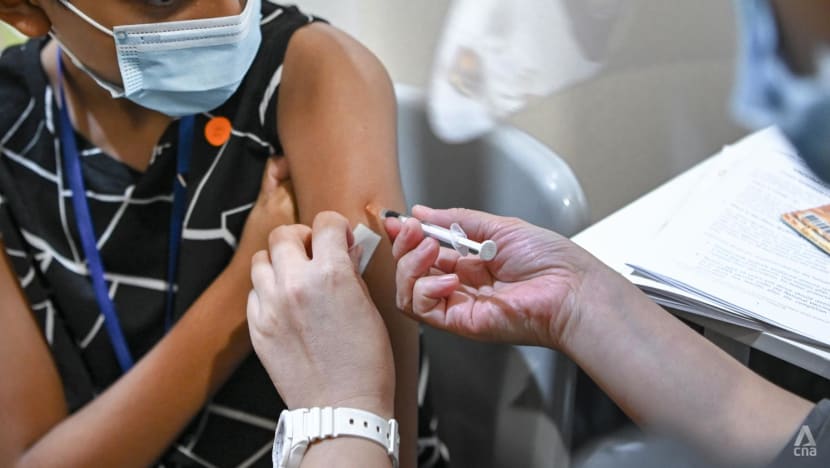COVID-19 vaccination booster shots for children aged 5 to 11 to be rolled out in about 2 months: MOH
Children aged five to 11 years old might need a third mRNA dose at some point to keep protection levels high, said Dr Janil Puthucheary.

A boy looking at the needle when taking his vaccination on Dec 27, 2021. (Photo: CNA/Hanidah Amin)
SINGAPORE: The Ministry of Health (MOH) plans to roll out vaccination booster doses for children aged five to 11 in about two months.
Speaking in Parliament on Monday (Aug 1), Senior Minister of State for Health Janil Puthucheary acknowledged that a third mRNA dose for this group of children “may be necessary at some point to keep protection levels high”.
“At present, the Pfizer-BioNTech/Comirnaty COVID-19 vaccine remains the only vaccine authorised for use in children aged five to 17 years in Singapore,” said Dr Puthucheary.
“Children who are not medically eligible for the Pfizer-BioNTech/Comirnaty COVID-19 vaccine may receive the Sinovac-CoronaVac vaccine under a dedicated public health programme, while Moderna’s vaccine for this age group remains under evaluation.”
VACCINATION FOR CHILDREN UNDER FIVE
Meanwhile, MOH is preparing to start vaccination for children aged under five towards the fourth quarter of 2022, said Dr Puthucheary.
The ministry said last week it was targetting vaccination for young children six months and above towards the end of the year.
These children under five years old are currently the last group not yet protected by vaccination.
“The Health Sciences Authority (HSA) is currently reviewing data submitted by Pfizer/BioNTech and Moderna on their COVID-19 vaccines for this age group. We will provide an update when an assessment of the quality, effectiveness and safety of the vaccines has been completed,” said Dr Puthucheary.
Currently, children under the age of five remain “more vulnerable to COVID-19 infection and have higher rates of severe outcomes compared to older children” – but this is similar to other respiratory diseases, he added.
“However, the overall incidence of severe outcomes from COVID-19 infection remains lower amongst children compared to adults and the elderly.”
Two young children in Singapore recently died from COVID-19. A four-year-old girl died in July, while a one-and-a-half-year-old boy died in June.
That said, Dr Puthucheary noted that based on local and international data, “the BA.4 and BA.5 Omicron subvariants have not been observed to affect children more severely than past variants, and severe COVID-19 infection continues to be rare in children, especially amongst those who are vaccinated”.
Should children need medical attention, they should seek help from a general practitioner or polyclinic, said Dr Puthucheary.
Children with acute respiratory infection (ARI) symptoms will be tested using the Antigen Rapid Test (ART) by default or the Polymerase Chain Reaction (PCR) test.
Children under three months old are admitted to hospital by default whereas older children under the Home Recovery Programme (HRP) are reviewed by doctors via telemedicine. This service is available round the clock, added Dr Puthucheary.
“Hospitals continue to prioritise care for children with urgent medical conditions, and those who require further observation and treatment will be admitted. MOH regularly reviews and updates the screening and review criteria with inputs from a panel of specialists.”
ORAL ANTIVIRALS
Under the Health Science Authority’s Pandemic Special Access Route, oral antivirals are licensed for use for patients aged 18 and above only, noted Dr Puthucheary.
For children aged between 12 and 18, local and overseas treatment guidelines indicate that Paxlovid may be considered on a case-by-case basis, he said.
The Health Ministry will continue to review the evidence for the use of oral antivirals for children under 18 years old.















